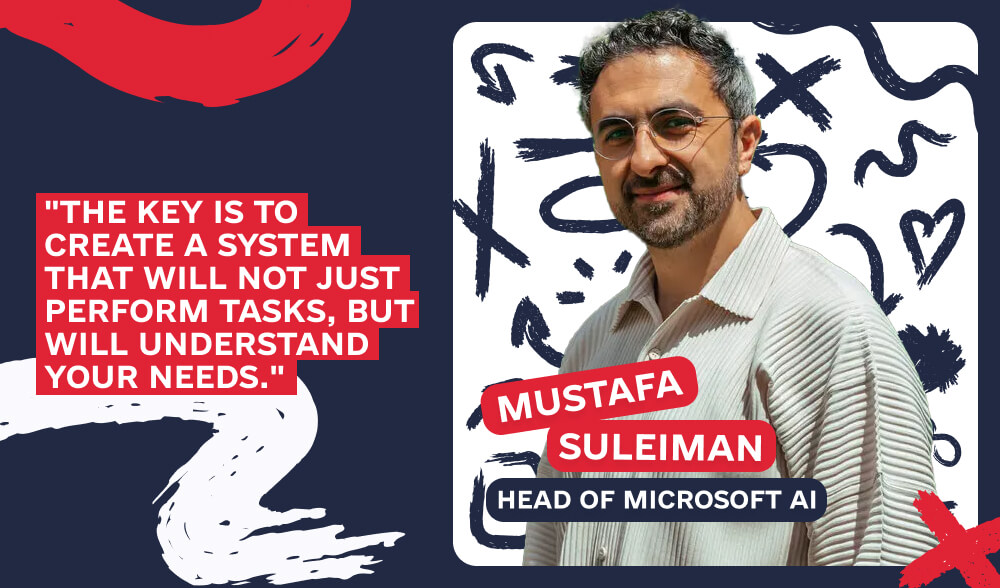Don't miss interesting news

We have collected the most interesting moments of the interview with Mustafa Suleiman, Head of Microsoft AI. Mustafa is an important figure in the world of artificial intelligence. He was one of the co-founders of DeepMind, which was acquired by Google in 2014. After that, Mustafa worked as a vice president at Google for several years until he founded a new AI startup, Inflection, in 2022.
Earlier this year, Inflection signed a deal with Microsoft to license its core technologies. This deal caused a lot of discussion because it was not a classic acquisition: Mustafa, his co-founder, and most of Inflection’s employees moved to Microsoft.
Mustafa Suleyman is currently responsible for all of Microsoft’s consumer AI products: the Copilot app, Bing, Edge browser, and MSN. These services seem to be rapidly changing the way we use the web in the world of artificial intelligence.
In this interview, we talk about the Microsoft AI framework, the collaboration with OpenAI, the future of AGI (artificial general intelligence), and how modern AI can change our lives.
AGI is a system that can learn and perform tasks at the human level. Does this mean that all knowledge can be automated?
Mustafa Suleyman: It is important to understand that AGI is not a singularity. A singularity is a self-improving system that quickly surpasses human intelligence. Instead, AGI is a generalized system that works well in all human learning environments.
I think that most knowledge and even physical labor can be automated within the next 5-10 years. But AGI doesn’t necessarily lead to a singularity. My goal is to create systems that will be useful for people, help them, and work on their side.
Many argue that current language models (LLMs) only “repeat” the data they were trained on. Do you agree with this?
Mustafa Suleyman: Two or three years ago, that was the case. But now we see that models are able to create new ideas by combining data in a multidimensional space. This is the beginning of creativity.
Another interesting aspect is whether models can be proactive, create ideas without prompts? This is an open question, but I am an optimist.
What will it take to make AI smarter?
Mustafa Suleyman: A lot depends on engineering. We already know how to work with model memory, how to add meta-thoughts about the current context. For example, “chains of thought” allow a model to perform actions in continuous environments by coordinating different parts of its memory.
Although there is still a lot of work to be done, there are clear signs that we are moving in the right direction.
Are you working on an advanced model that can compete with the Gemini, GPT-4 or GPT-5?
Mustafa Suleyman: Yes, within the current level of complexity. At the GPT-4 or GPT-4o level. But it depends on how events develop in the coming years, because each increase in order requires phenomenal physical resources. We are talking about hundreds of megawatts, and then gigawatts of power. By the time we get to 10 to the power of 27 FLOPS (floating point operations per second) for a single training cycle, there will be only three or four labs in the world that have the resources to train at that level. We will not duplicate this between us and OpenAI. OpenAI remains our partner for training advanced models, and I hope this will continue for a long time.
Why did you decide to join Microsoft, and why was the deal with Inflection structured the way it was?
Mustafa Suleyman: I have known Satya Nadella for a long time and he has been trying to convince me to join Microsoft for a long time, starting in 2017. His leadership style has always inspired me. The company is now in a very strong position: investments in computing resources, the scale of distribution through M365 Copilot partners – this is a real breakthrough.
We had significant success with Pi at Inflection earlier: the average duration of voice sessions was 33 minutes per day, but the market is extremely competitive. Other players are willing to invest for years and make their products free, if not even cheaper. That’s why Satya’s offer to lead all consumer businesses at Microsoft was a chance to realize our long-term dream: to create a true AI companion for millions of users.”
Mustafa Suleiman: Microsoft is a huge organization with a quarter of a trillion dollars in revenue and 280,000 employees. The distribution of responsibility for P&L between individuals is very logical. My organization employs about 10,000 people. We do everything from training models and building infrastructure to managing the advertising platform and integrating with the four major platforms.
Mustafa Suleyman: Microsoft has a higher discipline around revenue and long-term planning. Google has more instinctive creativity, but it sometimes becomes reactive. At Microsoft, every Friday is a detailed senior management meeting where all major business areas are reviewed. There is a strong focus on customers and their needs, while Google often focuses on creating cool technology.
Microsoft remains one of the strongest players in the field of artificial intelligence today, which is due not only to investments in computing resources, but also to its strategic approach to business, product integration, and customer service. The company’s innovative approach allows it to create scalable solutions, such as the M365 Copilot, which are already becoming disruptive in their segment.
Mustafa Suleyman’s joining Microsoft and his role as CEO of Microsoft AI demonstrate the company’s ambitious plans to expand its influence in the consumer AI space.
It is clear that the future of Microsoft AI promises significant achievements that will shape not only the market but also the way people interact with artificial intelligence in their everyday lives.